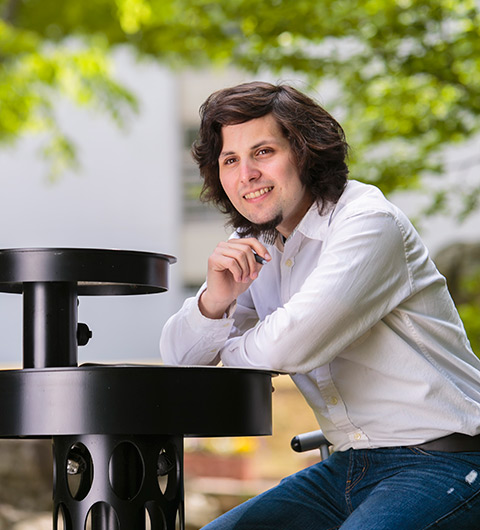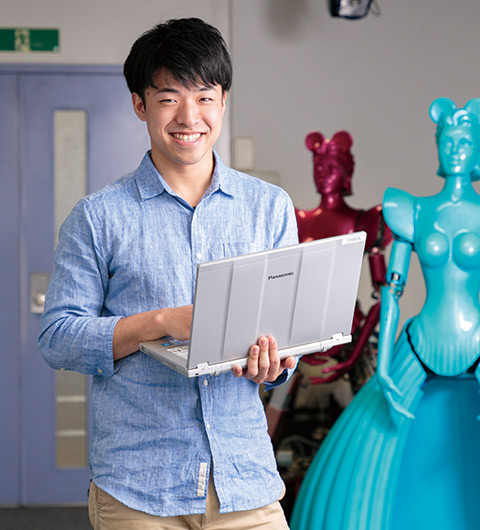
Libero Martinez Carlos Alexsis
(From Puerto Rico)
Master’s Course 1st year
Adachi laboratory of Department of Nano-mechanics, Graduate School of Engineering, Tohoku University
*The article and collected materials as well as affiliation, and year and content are as stated (May, 2015).
Learning about Japanese science technology through automobiles.
A place I have always wanted to go to for learning and research and become my home.
Consider to study abroad at the Division of Mechanical Engineering and vision of future through advanced research.
I was familiar with many kinds of automobiles in the world because my father worked as a mechanic repairing automobiles. Japan’s automobile technology and quality are wonderful and I had started to dream about studying engineering in Japan because of that. I heard the Division of Mechanical Engineering at Tohoku University was developing advanced and creative research that made it stand out among a number of similar universities and that was why I aimed to study at Tohoku University.
While attending Tohoku University’s undergraduate program, I had transferred to universities in the United States and then Korea in the middle of my degree. However, I consistently and deeply learned and researched in programs for international students at Tohoku university (JYPE→IMAC-U→IMAC-G). I could get credits just only in English during my undergraduate studies. On this opint,language was not an obstacle. However, there aren’t official opportunities of learning Japanese and I have to learn Japanese in daily life. By practicing like this, I can’t help but think of a Japanese proverb, “Narau yori Narero,” which means “Practice makes perfect.” But, Kanji (Japanese writing) is still difficult for me. Of course, the culture is also different and I got confused by Japanese culture at first when I came to Japan. My motto is “think flexibly and accept everything.” I think it is important to enjoy the culture and life style that is different than your homeland with a positive attitude.
Publishing a paper on my research results from SAW motor and spreading research globally.
SAW (surface acoustic wave) motor has been my subject since graduation research. This is actuator friction driving based on tribology (science technology about practical problems of friction, abrasion, and lubrication) knowledge. I start from design to construction to experimenting and then try to clarify mechanisms; however I continually experience trials and errors. I study previous research and reflect on various approaches to my ideas and then I give it my best shot. When I can get results that are in line with my hypothesis, I am really glad and I feel that my hard work paid off. At the ADACHI laboratory, we are planning to write up and send a paper to an academic journal about the research results of our SAW motor and I’m in charge of collating everything. It is a big responsibility and I will do my best.

Masaya Kamioka
(From attached high school of Hiroshima University)
Kosuge・Kinugawa laboratory/Arai laboratory of Department of Robotics at Graduate School of Engineering, Tohoku University
2nd year of Master Course
The origin of my interest was craftsmanship that I experienced when I was a child. My starting point of research and development was to discover the point where society and individual lives intersect.
Job-hunting to open my future up with extensive career support.
When I was an elementary school student, I made a wood bench in a DIY shop, which was really fun and I thought of becoming a carpenter. After I became a high school student, I wanted to learn about the most advanced manufacturing and I aimed to become a part of the school of engineering. One of the reasons I chose this university from among a number of similar universities was the survey result about generous career support that I saw and I really realized that the data was correct near the time I was job hunting.
In addition, when I was a 3rd year high school student I had gone to this department’s open campus where I had seen and touched nearby robots. This experience made me deeply impressed and think that life would become more convenient with them. That was another reason I chose this university. To make robots a “familiar technology” is very important for me and it was the starting point that I thought of so long ago. Now I can participate in practical and useful research developing robots that currently exist in the fringes of society, but someday I hope they will become more commonplace.
Participating in a cooperative research project with a company.
Practical skills learned in a challenging environment.
Since I was a 4th year undergraduate student, I joined a cooperative research project with a large manufacturer and I have been working to research and develop robots and systems that support an operator in an assembly line of a factory. We get requests from the company to reduce work times, places, and operational errors that would also lead to a cost reduction. Even if we have some good ideas, that idea would not be always implemented because of cost, flow line, or other reasons. I’m working with people on-the-spot so I feel a sense of urgency. I got an unforgettable experience when this project started; a person from the company told me that it was a problem to seem like a student. Robots have an appealing aspect to research or develop, but as a matter of fact, 90% of the work is stacks up like any other same old work. Although when robots and systems are implemented in the field, I feel a sense of achievement and that makes all my hard work worth it. I would like to manage research and development in the future. I certainly consider being assigned abroad. Therefore, I’m brushing up on my communication skills by having conversations in English with international students in my laboratory.
